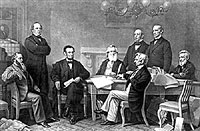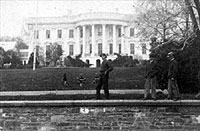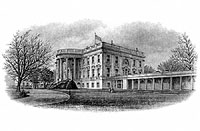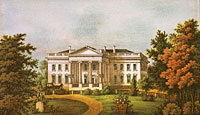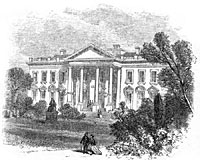In Springfield, where the Lincolns had lived for the previous two decades, the Lincoln family had trouble keeping a single servant girl to help Mary Todd Lincoln. In the White House, there was an extensive staff to tend to the gardens and the family’s well-being. The Lincoln boys not only gained their own bedrooms, they acquired a set of nooks, crannies, stables and attics to fit their childhood fantasies. In reality, however, only seven of the house’s 31 rooms were actually “theirs” — the parents’ bedrooms, those of their sons, a sitting room on the second floor and a private dining room.
Still, the White House was not Springfield. Congressman Isaac Arnold was a strong Lincoln loyalist and abolitionist. After the Civil War, he served as the longtime president of the Chicago Historical Society and compiled a biography of Lincoln in which he wrote about his friend: “It will interest those who did not see him at the White House, and who have come on the stage since his death, to know something of his life and habits while he lived in the Executive Mansion. At Springfield, his home was a small, modest, comfortable, wooden cottage, such as is found everywhere in the villages of our country. Here he lived in a quiet unostentatious manner, without any pretension, and dispensed to his personal friends and members of the bar and judges, a cordial but very simply hospitality. At the White House, he was compelled by custom and usage to have large receptions, to give dinners, and to adopt a life of conventional form and ceremony, to which it was not easy for him to conform, and which was far less agreeable than the simple and easy life he had led before.”1
Ward Hill Lamon, wrote of his friend and sometime legal associate: “Mr. Lincoln was always simple in his habits and tastes. He was economical in everything, and his wants were few. He was a good liver; and his family, though not extravagant, were much given to entertainments, and saw and enjoyed many ways of spending money not observable by him. After all his inexpensive habits, and a long life of successful law practice, he was reduced to the necessity of borrowing money to defray expenses for the first months of his residence at the White House. This money was repaid after receiving his salary as President for the first quarter. Lamon recalled an earlier incident with Mrs. Lincoln: “A few months after meeting Mr. Lincoln, I attended an entertainment given at his residence in Springfield. After introducing me to Mrs. Lincoln, he left us in conversation. I remarked to her that her husband was a great favorite in the eastern part of the State, where I had been stopping. ‘Yes,’ she replied, ‘he is a great favorite everywhere. He is to be President of the United States some day; if I had not thought so I never would have married him, for you can see he is not pretty. But look at him! Doesn’t he look as if he would make a magnificent President?'”2
For Mary Lincoln, the White House was a political goal, a social challenge — and a private hell. Here, funerals for both her beloved son Willie and her revered husband were held. Indeed, the first major Union casualty of the war, Elmer Ellsworth, was a close family friend. His funeral too was held here in May 1861. Another important family friend, Colonel and Senator Edward D. Baker, visited the White House before he died in an early Union defeat in October1861. Willie here penned a precocious poetic remembrance of the family friend. And here his father penned hundreds of pardons and directives of military compassion. The Emancipation Proclamation was conceived here and the 13th Amendment that ended slavery was signed here – the first time a constitutional amendment was signed by a President.
Although the White House address is now 1600 Pennsylvania Avenue, it was not until a decade after President Lincoln took office that the number was added to the address. President Lincoln himself spoke of his tenure at the presidential mansion in a speech to One Hundred Sixty-sixth Ohio Regiment on August 22, 1864: “I suppose you are going home to see your families and friends. For the service you have done in this great struggle in which we are engaged I present you sincere thanks for myself and the country. I almost always feel inclined, when I happen to say anything to soldiers, to impress upon them in a few brief remarks the importance of success in this contest. It is not merely for to-day, but for all time to come that we should perpetuate for our children’s children this great and free government, which we have enjoyed all our lives. I beg you to remember this, not merely for my sake, but for yours. I happen temporarily to occupy this big White House. I am a living witness that any one of your children may look to come here as my father’s child has. It is in order that each of you may have through this free government which we have enjoyed, an open field and a fair chance for your industry, enterprise and intelligence; that you may all have equal privileges in the race of life, with all its desirable human aspirations. It is for this the struggle should be maintained, that we may not lose our birthright–not only for one, but for two or three years. The nation is worth fighting for, to secure such an inestimable jewel.”3
Historian Allen C. Guelzo wrote: “Lincoln, who had taken such pleasure (and built such a formidable political following) from riding the Eighth Judicial Circuit, as president hardly ever stirred out of Washington. Unlike his Confederate counterpart, Jefferson Davis (who made several extended state trips through the Confederacy to rally Southern morale or consult with distant field commanders), Lincoln stayed close to his White House desk and the War Department telegraph center, and declined all but a handful of requests and invitations to appear at mass political meetings or public demonstrations. He contemplated briefly an invitation in 1863 for a major midwestern Republican political rally, but in the end, he turned even that down.”4
The 1864 Stranger’s Guide-book to Washington City reported: “The Presidential mansion, known all over the country as the “White House,” is on Pennsylvania avenue, at a distance of over a mile west of the Capitol. The building is of freestone, painted white, and was erected after a plan of the architect Hoban, and its erection was commenced in 1792. In 1814 the British partially destroyed it, and the work of rebuilding was commenced in the following year (1815), under the superintendence of the same architect. It is 170 feet front, and has a depth of 86 feet, and is situated on a plat of ground comprising an area of 20 acres ; and the building itself is on an elevation of 44 feet above the Potomac. The edifice is of lofty dimensions. The north front presents the appearance of a building two stories high, and is ornamented with a lofty portico, which was added to the main building during the presidency of General Jackson. This portico has four columns of the Ionic order in front, supporting the massive covering of the stone platform in frost of the main entrance. Three other columns of the same order form a projection which covers a carriage way; and from this carriage way the visitor steps upon the platform above referred to. In front of this portico is a neatly ornamented yard, of semicircular form, with carriage ways and foot pavements leading to gates at either corner, which afford ingress from Pennsylvania avenue. In this yard stands a bronze statue of Thomas Jefferson, which was presented to the Government by Capt. Levy, U. S. N”. Also in front of the Executive Mansion, but on the opposite side of Pennsylvania avenue, is Lafayette Square, which is beautifully ornamented with trees, shrubbery, and flowers, and which has become a fashionable promenade and resort, its walks being, every fine day and evening, thronged by the beauty and fashion of the National Capital. This square contains the celebrated equestrian bronze statue of Jackson, the work of Clark Mills, who has the honor of being the first artist to succeed in erecting a statue representing a steed poised upon the hind feet. Cannon, captured by Jackson in his conflicts with the British, constituted the material of which the statue was made. It cost $50,000. The south part of the Executive Mansion looks toward the Potomac. Upon this side the building presents a rusticated base, and gives a facade of three stories. This front is ornamented with a colonnade of six columns of the Ionic order, and has two flights of steps, which lead from the garden to the principal story. The garden upon this side of the Mansion is a lovely spot, and a favorite resort. The grounds are laid out in a tasteful and romantic style, adorned with artificial mounds, trees, shrubbery, flowers, and a fountain. From these grounds a splendid view is obtained of the surrounding country, the Potomac, and the City of Alexandria.”
Appended to the main building of the Mansion are projections at either end, with rooms and apartments fitted up for various household purposes ; and the western projection is surmounted by a magnificent greenhouse, containing the rarest and most beautiful exotics.
The interior of this home of the Presidents is fitted up in a style to correspond with its handsome and rich exterior. Nearly all parts of the house are accessible to visitors, and something to interest may be found in all the apartments ; but the east room is especially deserving of attention. This room is 80 feet long, 40 feet wide, and 22 feet high, and is furnished with much splendor.5Noah Brooks’ Summary
On November 7, 1863, Noah Brooks recorded his impressions of life in and around the White House. Although a journalist, Brooks was close to both the President and his wife and had unusual access to White House affairs. His positive image of Mrs. Lincoln was not shared by many who worked with and visited the Lincolns:
“The edifice is tolerably familiar in appearance to most people who have seen the engravings of the house, which is usually represented with the Potomac front toward the spectators that really fine face of the building is higher and not covered with the overgrown portico which so disfigures the Avenue front that it looks like a big portico which had been built to conceal the house behind it. The Potomac front has sloping grounds, decorated with vases, statuary and ornamental gardening, between it and the unoccupied public square on the river bank; but the main entrance to the house is on the front which faces Pennsylvania avenue, and a pair of massive gateways open from the avenue upon the semi-circular driveway which leads to the portico, and thus incloses a small park, in the center of which stands the bronze statue of Jefferson (not Davis), with the Constitution in his hand, which statue aforesaid is green and moldy with time and is in seedy contrast with the smug-looking effigy of Old Hickory, cutting off the right ear of his rampant charger, which stands in the square across the avenue, and is known as the Clark Mills statue.
Let us go into the Executive mansion; there is nobody to bar our passage, and the multitude, washed or unwashed, always has free egress and ingress beneath the awful shadow of this immense portico, whose tall columns stand thickly around us. A small vestibule opens into a wide hall, handsomely carpeted, which has a bronze and ground glass screen separating the state and family apartments from the more public part of the house. At the right is an ante-room for the servants in waiting, and beyond that is the dining room – not a very sumptuous room – only accommodating thirty-five at table. Beyond this are family rooms and a large conservatory, and in the basement are servants’ rooms, kitchen, etc. We have no ‘kitchen Cabinet’ during this Administration, but the present presiding lady of the White House has caused a terrible scattering of ancient abuses which once accumulated below stairs. The suckers who grew rich on the pickings and stealings from the kitchen, garden and conservatory, and who had spies in every room in the house, have been dispersed, and when they went they circulated innumerable revengeful yarns concerning domestic weaknesses at the White House, and there were some credulous people who believed them. The right or west wing of the house is occupied by the President family, the center by the state parlors, and the easy wing has below stairs the famous East Room, and upstairs the officers of the President and his Secretaries. The parlors which are used for ordinary receptions are entered from a corridor behind the screen which forms one side of the main hall of entrance, and are three in number, being called severally the blue, green and crimson drawing rooms, from the color of the upholstery and fittings. The last named of these is the favorite sitting room of Mrs. Lincoln, where she receives private calls every evening in the week when in town, and where the President usually meets his friends socially after dinner. The furniture is very rich – of crimson satin and gold damask, with heavy gilded cornices to the windows and a profusion of ormulu work, vases, etc., some of which stuff is very ancient, being bought or presented during Monroe’s and Madison’s administration. There is a grand piano in this room and a full length portrait of Washington; but generally, the walls of the White House are destitute of paintings, the want being remedied by gilded and richly colored hangings. It would be a sensible notion if some Congress, more thoughtful and public-spirited than any which we have yet had, would make a small appropriation for the purpose of hanging in the house of the Chief Magistrate of the nation a few pictures by the best American artists, which might form a nucleus for a gallery of art in the home of the President and his family. The walls of the house would be relieved of their unfurnished bareness, and a portion of the severe simplicity of the White House would be graced thereby. The blue drawing-room is much admired by most people, as its fittings are quite sumptuous in style and finish. The room is formed in the graceful curves of a perfect ellipse, and the windows command a lovely view of the grounds in the rear of the house and of the Potomac. The furniture is of blue and silver satin damask; the woodwork of the chairs, sofas, etc., being solidly gilt, as also are the heavy cornices of the doors and windows; broad mirrors,, with massive frames, surmount the marble chimney-pieces, and a blue and white velvet carpet covers the floor. The ceiling is painted in fresco, in which blue is the prevailing tint, and the walls are covered with blue and gold hangings; in short, it is all so ‘deeply,, darkly, beautifully blue,’ that one feels quite cerulean therein. In this room are many of the Japanese presents to President Buchanan, which constitute a part of the furniture of the house, under the law which confiscates all presents to Government officials to the use of the Government. These drawing rooms all communicate with each other and with the great East Room, and upon some occasions they are all thrown open. The East Room occupies the entire principal floor of the east wing of the house, and is well known to most people by the common engravings of it. The ceiling is frescoed in a very ordinary style, cupids, flowers and such sprawling about overhead in a very loose manner, the unbreeched urchins looking as though a suit of Uncle Sam’s uniform would not come amiss this cold weather. The lace curtains, heavy cords and tassels and damask drapery, have suffered considerably this season from the hands of relic-hunting vandals, who actually clip off small bits of the precious stuff to carry home as mementoes, I suppose. I wonder how they have the ‘cheek’ to exhibit their trophies to admiring friends at home and complacently relate how they stole them. Some of these aesthetic pilferers have even cut out small bits of the gorgeous carpet, leaving scars on the floor as large as a man’s hand. Others, on larger game intent, have actually cut off a yard or two from the lower end of some of the heavy crimson satin window hangings.
If we go up stairs at any hour after Washington people are stirring we shall find the corridors and waiting-rooms full of people who have business or curiosity urging them into the present of the President. The grim Cerberus of Teutonic descent [John G. Nicolay] who guards the last door which opens into the awful presence has a very unhappy time of it answering the impatient demands of the gathering, growing crowd of applicants which obstructs passage, hall and anteroom. It would not be a bad idea if an inside guardian of affable address, as well as flintiness of face, were placed on duty here, where the people come almost in actual contact with the great man within, whom they learn to love or dislike, according to their treatment by his underlings. The President is affable and kind, but his immediate subordinates are snobby and unpopular. A wide corridor opens on the left into the private rooms of the Secretaries, and on the right to the office of the Private Secretary, J.G. Nicolay, and to the private office of the President. The room of the Secretary is a small office, very meagerly furnished, and old-fashioned in appearance as, in fact, is all of the upper part of the mansion – the dark mahogany doors, old style mantels and paneled wainscoting being more suggestive of the days of the Madisons and van Burens than of the present. There are usually three Private Secretaries to the President, of which one only is contemplated by law, receiving a yearly salary of $2,500, carriage and perquisites; but the extraordinary exigencies of the public service have obliged the President to employ two assistants, who are clerks detailed from the Departments and drawing their salaries therefrom. These three Secretaries are all young men, and the least said of them the better, perhaps.
When the President lives in town he commences his day’s work long before the city is astir, and before breakfast he consumes two hours or more in writing, reading or studying up some of the host of subjects which he has on hand. It may be the Missouri question, the Maryland imbroglio, the Rosecrans removal question, or the best way to manage some great conflicting interest which engrosses his attention, but these two best hours of the fresh day are thus given to the work. Breakfast over, by nine o’clock he has directed that the gate which lets in the people shall be opened upon him, and then the multitude of cards, notes and messages which are in the hands of his usher come in upon him. Of course, there can be no precedence, except so far as the President makes it; and, as a majority of the names sent in are new to him, it is very much of a lottery as to who shall get in first. The name being given to the usher by the President, that functionary shows in the gratified applicant, who may have been cooling his heels outside for five minutes or five days, but is now ushered into a large square room, furnished with green stuff, hung around with maps and plans, with a bad portrait of Jackson over the chimney piece, a writing table piled up with documents and papers, and two large, draperied windows looking out upon the broad Potomac, and commanding the Virginia Heights opposite, on which numberless military camps are whitening in the sun. The President sits at his table and kindly greets whoever comes. To the stranger he addresses his expectant ‘Well?’ and to the familiar acquaintance he says, ‘And how are you to-day, Mr. —–?’ though it must be confessed that he likes to call those whom he likes by their first names, and it is ‘Andy’ (Curtin), ‘Dick (Yates), and so on. Seward he always calls ‘Governor,’ and Blair or Bates is ‘Judge;’ the rest are plain ‘Mister,’ never ‘Secretary.’ With admirable patience and kindness, Lincoln hears his applicant’s requests, and at once says what he will do, though he usually asks several questions, generally losing more time than most businessmen will by trying to completely understand each case, however unimportant, which comes before him. He is not good at dispatching business, but lets every person use more time than he might if the interview were strictly limited to the real necessities of the case. Consequently, Lincoln cannot see a tithe of the people who daily besiege his ante-chamber; and, in his anxiety to do equal and exact justice to all, excludes or delays those who might see him sooner if he did not try to do so much. No man living has a kinder heart or a more honest purpose than Abraham Lincoln, and all who meet him go away thoroughly impressed with the preponderance of those two lovable and noble traits of his character. Is the petitioner a poor widow who wants a writership on one of the departments – the President has read her credentials, asked a question or two in his quiet but shrewd way, and he takes a card on which he writes a plain request to a Cabinet Minister to give the bearer what she craves, and the grateful woman goes out, blessing the good-natured President whose very next act may be to receive a distinguished foreign diplomat whose Government is hovering on the doubtful verge of an American war; or it may be a Brigadier wanting promotion, an inventor after a contract, a curiosity hunter with an autograph book, a Major General seeking a command, a lady with a petition for a pass to Richmond, a Cabinet Minister after a commission for a favorite, a deputation asking an impossibility, or a Committee demanding an impertinence; it may be all or any of these who come next, and the even-tempered statesman who patiently sits there, interlarding the dull details of business with a good-natured joke or anecdote, must wisely and quickly decide upon questions which vary in importance from a small favor to a humble dependent to the adjustment of one of the most momentous National interests of the times. Is it not wonderful that so little that is open to criticism is done by him, rather that we have anything to find fault with? When we recollect that every day, except Sunday, is occupied in the manner thus described, from nine o’clock until three o’clock in the afternoon, and that during the sessions of Congress several hours of the evening are also thus taken up, it is a matter of surprise that the President can find time to do so wisely and so well the various work which comes from his hands. Of course, during all of these interviews he is liable to interruption from his Cabinet Ministers, who have free access to him at all business hours; Senators and Governors of States come next in precedence, and representatives come last before ‘citizens generally.’ Usually, no foreign functionary seeks an interview with the President except through the prescribed channel of the State Department, and etiquette requires that all foreigners shall be presented to the Secretary of State by the Minister of the country to whom the person seeking an interview belongs, and in this roundabout way the party follows up the clue of red tape until he arrives in the presence chamber
The President dines at six o’clock, and often invites an intimate friend to take pot luck with him, but he and his estimable wife are averse to dinner-giving or party-making, only deviating from their own wishes in such matters for the purpose of gratifying people who expect it of them. They much prefer the same sort of social, unrestrained intercourse with the family that most sensible people do, and have a wholesome horror of state dinners, which are invariably prolific of discord, ill feeling and big expenses. Lincoln is strictly temperate and simple in his habits; to this and his faculty of throwing off the oppressive weight of care, the like of which no man ever bore before him, he owes his life, and the country owes its security in these perilous times, when a cool head, a firm hand and an honest heart are needed at the head of our vast public affairs. While the most enthusiastic admirer of Lincoln would [be?] reluctant to claim for him a combination of all the endowments and acquirements of his predecessors in office, it does appear to me that it is impossible to designate any man in public life whose character and antecedents would warrant us in the belief that we have any one now living whose talents and abilities would fit him to administer this Government better than it has been conducted through the past three stormy years by the honesty, patriotism and far-sighted sagacity of Abraham Lincoln. That is merely an opinion, to be sure, but it is not an unintelligent one, and the writer hereof shares it in common with a great cloud of candid witnesses.
The wife of the President has been so frequently and cruelly misrepresented and slandered that, though hesitating to approach so delicate a subject, your correspondent cannot refrain from saying a word in strict justice to this distinguished and accomplished woman. When the present Administration came into power, the National Capital was infested as well as besieged by rebels, and every conceivable means was adopted to render the members of the new Administration unpopular. To this end slanders innumerable were circulated concerning the habits of the Presidents and his family; and it is not many months since when candid and loyal men were to be found believing that our temperate President drank to excess, and that Mrs. Lincoln was a vulgar, ill-bred woman. Such stories are scandalous, and though time has done justice to the President, who is seen and read of all men, Mrs. Lincoln is denied the privilege of defense, and in the privacy of a house-hold clad in mourning has not yet had justice done her by the public. The slanderous tales of those who prayed daily that ‘Lady Davis’ might occupy the White House are still circulated and believed, and loyal people, more shame to them, without knowing the truth of what they repeat, still allow themselves to become the media for the dispersion of scandals as base as they are baseless. It is not a gracious task to refute these sayings, but the tales that are told of Mrs. Lincoln’s vanity, pride, vulgarity and meanness ought to put any decent man or woman to the blush, when they remember that they do not know one particle of that which they repeat, and that they would resent as an insult to their wives, sisters or mothers that which they go glibly repeat concerning the first lady in the land. Shame upon these he-gossips and envious retailers of small slanders. Mrs. Lincoln, I am glad to be able to say from personal knowledge, is a true American woman, and when we have said that we have said enough in praise of the best and truest lady in our beloved land.6
Footnotes
- Isaac Arnold, The Life of Abraham Lincoln, p. 451.
- Ward Hill Lamon, Recollections of Abraham Lincoln, pp. 20-21.
- Roy Basler, editor, Collected Works of Abraham Lincoln, Volume VII, p. 512.
- Allen C. Guelzo, Abraham Lincoln: Redeemer President, p. 276.
- T. Loftin Snell, The Stranger’s Guide-book to Washington City, pp. 22-24.
- Michael Burlingame, editor, Lincoln Observed: Civil War Dispatches of Noah Brooks, pp. 79-88.

